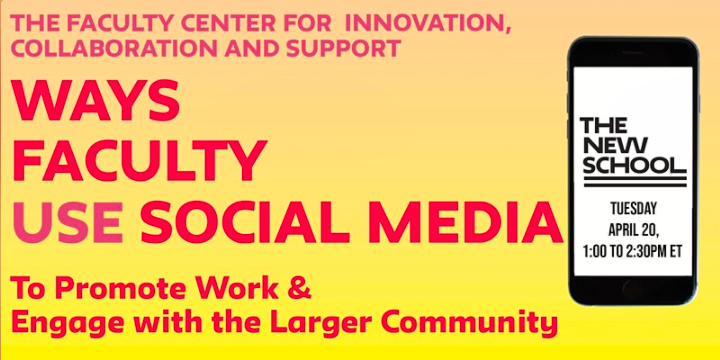Always more to learn on this topic, so I appreciate this event from @TheNewSchool with perspectives from Twitter friend @nataliapetrzela, as well as @profcarroll, @shannonmattern, @mckenziewark, and Mira Jacob.
To start, @nataliapetrzela shares that she uses social media as an academic to work through ideas/projects, amplify others& #39; fab work, and to form connections, the last of which has been key during the pandemic.
For @profcarroll, his experience changed on Twitter once he was verified (blue check mark), in some cases for the better (easier to be, & perceived as, influential & authoritative), but also can be for the worse, especially if not a privileged social position, i.e. a white man.
A good point from @mckenziewark to use the block and mute as needed. Social media isn& #39;t always a hospitable place, depending upon one& #39;s social identity.
Sharing different ways to use Twitter, @shannonmattern says it can be for collection building, resource sharing and gathering, and for amplifying students& #39; work, questions, and needs. Her use of social media is more antithetical to building influence and establishing status.
Both @shannonmattern and @mckenziewark cite listservs as precursors to social media, with similar pros for connection and scholarship, but also cons for how they reproduce existing inequities.
Point from @nataliapetrzela that no one will give you tenure for your use of Twitter, but Twitter connections can develop into invitations to be on panels, collaborate, submit, etc. in academic projects that do/can evolve into projects that institutions "count" and recognize.
Yes to @profcarroll pointing out that Twitter is a great space for academics to connect with and be available to journalists and policy makers, as a way for our research to have impact outside the academy, have influence, and be in different conversations.
Excellent point from @shannonmattern that academics shouldn& #39;t be on social media to just self-promote and try to change minds and claim intellectual space. Social media engagement needs to be about reciprocity.
Yes to @mckenziewark that *generosity* should be the foundation for one& #39;s social media engagement.
Also @nataliapetrzela discusses the issue of self-promotion. We spend a decade (or more!) on a dissertation or book, we shouldn& #39;t be shy to promote it, but balance is important for our overall presence. You shouldn& #39;t be on Twitter to only self-promote.
Interesting point from @profcarroll that social media platforms like Twitter were built to be addictive, for that feeling of "going viral" to be seductive and thrilling. "Social media success" can be challenging to manage in a critical, thoughtful way.
Panelists collectively agree that just like how we need to balance what we post, we should also balance how we share both "good news" and wins, but also vulnerability, frustrations, and failures. Don& #39;t overshare, but be real.
Really good point from @shannonmattern that we should not and cannot *individualize* dealing with trolling and online harassment, esp. as universities encourage public engagement. This isn& #39;t about just protecting yourself, but how institutions need to further develop processes.
Important remarks from @mckenziewark about how the need for online harassment policies and protection is even greater for trans scholars, whose popular accounts are very visible, but often have to strategically seek invisibility for safety.
Love @shannonmattern pointing out that academic freedom on social media is not just about being able to speak freely, but also to push the academy to be a more just, equitable, and inclusive institution.
True too, as @profcarroll discusses, that universities vary greatly in how they promote public scholarship and establish policies to support it (for both tenure criteria and for online protections), or not, or even discourage/punish it.
Good tip: @nataliapetrzela says she rarely pitches an op-ed without first doing a Twitter thread on the topic. It helps her to lay out the ideas *&* helps to test the audience interest and response.
(I know @SonyaBonczek recommends this! The thread can attract editors too.)
(I know @SonyaBonczek recommends this! The thread can attract editors too.)
Love @shannonmattern& #39;s point that as scholars we& #39;re allowed to be (and should be!) passionate and excited and joyful in our work and in our online presence.
(This resonates a lot with me, as folks sometimes perceive me as too girly/silly because I don& #39;t edit out my joy, ever.)
(This resonates a lot with me, as folks sometimes perceive me as too girly/silly because I don& #39;t edit out my joy, ever.)
Tip from @profcarroll re: trolls/harassment: the "soft block" = block someone and then click undo, so they& #39;re not your follower, so they can& #39;t engage with you as readily. Link on this from @shannonmattern: https://www.businessinsider.com/how-to-soft-block-on-twitter">https://www.businessinsider.com/how-to-so...
Mira Jacob also responds to @mckenziewark& #39;s comments on engaging as play and fun. She says especially on Instagram and with the stories feature this engagement can feel fun and playful, not like work.
Point from @profcarroll that you don& #39;t necessarily have to jump onto Clubhouse and learn a new platform, but recognize that audio features will likely be coming to existing platforms and we can consider if/how that will be useful for academics as public scholars.
Yes from @shannonmattern to never forget the political economy of these platforms as we decide which spaces we want to be in personally and professionally, and pedagogically too.

 Read on Twitter
Read on Twitter


